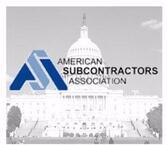
We would like to thank Skip Daum of Capitol Communications Group for providing ASAC Members fabulous advocacy for almost 25 years. Skip has always been a steady voice and provided immense guidance to the Government Relations Committee and ASAC Members, by providing California's trade contractor businesses the ability to realize many very important victories. We couldn't have done it without Skip's valuable guidance, planning, relationships with the ever-changing legislators of California, many industry organizations, and everyone he came into contact with. His knowledge and experience as an advocate, along with his previous roles in life, including serving our country, and his amazing personality based in reality provided success for ALL California trade contractors throughout the state. After decades of representation, Skip will be retiring at the end of 2023 to enjoy the fruits of his labor and bask in his vast accomplishments. We at the ASAC and GRC will miss Skip immensely, his steady advice, constant finger on the pulse of serious issues affecting subcontractor's concerns, and of course the wonderful personal friendships that have grown out of working with Skip. There aren't words to express our thanks to you Skip, we are humbled by your representation!
Thanks to Skip's excellent guidance, we would like to take this opportunity to introduce ASAC's new advocacy group, McHugh Koepke Padron Government Relations (MKP). The team at MKP have been working with Skip and ASAC for the past six months to ensure a smooth transition. Their experience, immense knowledge, and relationships, have been so suppurative to the ASAC GRC team in this transition. Their team has an excellent reputation at the Capitol and beyond. We have all the confidence they will provide ASAC Members the advocacy we have enjoyed over the decades. California's subcontractor community will be served very well. Please join us in welcoming the MKP team, we look forward to continuing to work with you and all our victories ahead!
Gavin McHugh | Shari McHugh | Dawn Koepke | Naomi Padron
https://www.mchughgr.com/MKP online
Thanks to Skip's excellent guidance, we would like to take this opportunity to introduce ASAC's new advocacy group, McHugh Koepke Padron Government Relations (MKP). The team at MKP have been working with Skip and ASAC for the past six months to ensure a smooth transition. Their experience, immense knowledge, and relationships, have been so suppurative to the ASAC GRC team in this transition. Their team has an excellent reputation at the Capitol and beyond. We have all the confidence they will provide ASAC Members the advocacy we have enjoyed over the decades. California's subcontractor community will be served very well. Please join us in welcoming the MKP team, we look forward to continuing to work with you and all our victories ahead!
Gavin McHugh | Shari McHugh | Dawn Koepke | Naomi Padron
https://www.mchughgr.com/MKP online




 RSS Feed
RSS Feed
